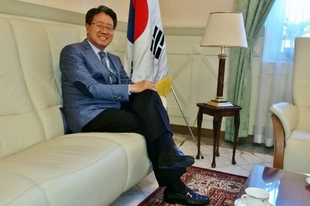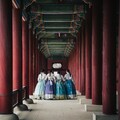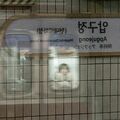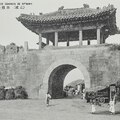When I entered, not even a needle could be dropped in the main hall of the Korean Cultural Center in Budapest, and it was pretty hard to find a free spot in the jam-packed place. Some of the audience prepared notebooks, pens, while others were stretching their necks for a better view. The event which brought such high attention, was the presentation on Korean-Hungarian relations given by H. E. Yim Geun-hyeong, the Ambassador of the Republic of Korea to Hungary. Few days following the event, I was greatly honored when His Excellency agreed to give an exclusive interview to „Korea in Hungary” at the Korean Embassy. He spoke of his dreams, career, experiences in Hungary, economy and politics, his impressions of the Hungarians, and cultural ties between Korea and Hungary. Our talk revealed a portrait of a devoted diplomat and person.
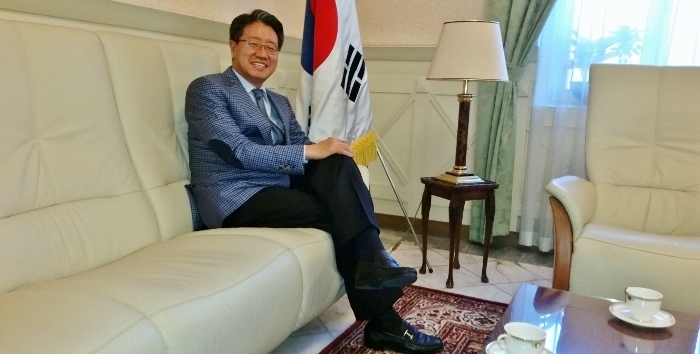
Q: Your Excellency’s presentation and the follow-up panel discussion have had a great impression on the Hungarian audience. However, with your permission, this present interview is intended to be a bit more informal and personal.
The Hungarian fans of Korean culture, films and dramas have the view that dreams and the „fated path” play extra important role in one’s life. Wouldn’t you please mind if I asked you about your dreams of childhood and youth, and then about the path you have stepped on?
H.E. Yim Geun-hyeong: Well, I think each human being have dreams, so this goes for me, too, of course. When I was born in 1959, Korea just had been through a terrible war between South and North, it was a torn-apart land with all its bitter reminiscences and pain. That time my country was down and poor, it was full of wrecked families and lives. My family was living a that-time normal and standard but far from an abundant-like life. I remember, as a little kid I was so sad about it, my heart was full of pain. As I grew into the age of an elementary schoolboy, we learned about far and very rich countries of Europe and the US, and my sorrow became deeper. By the time I started my high school studies this inner agony had become stronger, and the question arose in me: Why? Why has Korea had to live in such poverty throughout centuries? I started to be motivated by the wish that I wanted to do something helpful to contribute to my country’ rise, and I have realized that for this I need to learn history and foreign policy. I was deeply impressed by European philosophy and the American way of being successful. So my way lead to the university of high civil services and I graduated in international studies, and special course for diplomats. My ambition was to make Korea’s international relations wider, and so my first foreign post was France. Coming back to Korea I became the director of West European Bureau in Seoul, then I was deployed to Morocco, and then back to Paris. Having returned to Korea again I became the director general in charge of Europe, afterwards was posted to Denmark, as the Ambassador of Korea. Well, and since 2014 I have been in your country, Hungary.
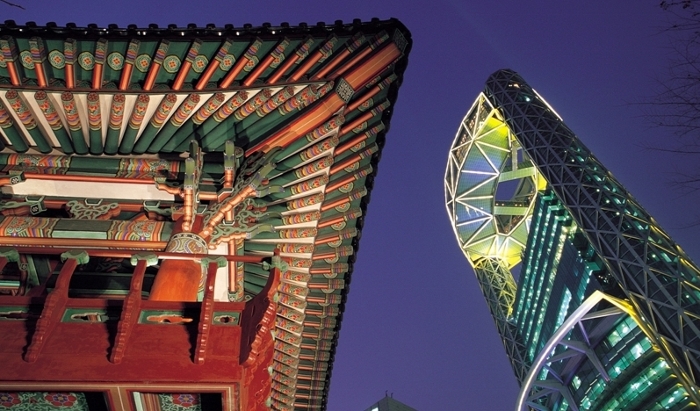
Q: What has been Your Excellency’s experience of being a Korean high ranking diplomat in West Europe? How has Korea’s relationship changed and developed with these countries?
H.E.Yim Geun-hyeong: I can say that there has been a sea of changes! Not only with Europe, but with the whole world. You know, I was posted to Paris in 1987 and it was really difficult back then. Why? Even in the late 80's South Korea, in spite of being a free capitalist country, was not recognized by the Western world as a significant player in the global economic and political field, instead, it was abandoned and unreached. We represented a minor factor even in our Asian region. This „invisibility” started to change only when in 1988 Seoul hosted the XXIV Olympic Games where 159 nations were participating, and the country has gone through an incredible economic and financial boom. Since that point my country was not negligeable any more, Korea has been regarded with well grounded reasons as a significant player on the global palette, whose voice should be heard by the world, and must be respected. This has made the Korean nation proud and confident.
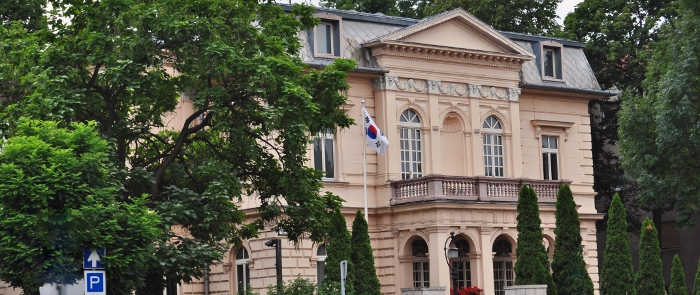
Embassy of South Korea in Budapest
Q: You were delegated in the capacity of Ambassador to Hungary in 2014. Could you please recall your first pieces of impression? Have you had any special expectations or, let’s say, preconceptions related to your Budapest mission?
H.E. Yim Geun-hyeong: Well, let me go back a little bit in history again. Our full diplomatic relations were formally established with Hungary, the first socialist country among East European states, on 29 January in 1989, with a good reason from our side. This reason was the 1956 Revolution. Before that even the name of Hungary had not been known for the great majority of Koreans at all. The Korean War ended in 1953, Korea was divided into two and we were the in the forefront of anticommunism. That period was the time of the cold war and this part of East Europe was regarded as the big communist block under the ultimate influence of the Soviet Union and, as such, a hostile empire for us. And then, out of the blue, a very small nation rebelled against the big giant, trying to get rid of its dictatorship and ideology. That’s something when you perk up your head: What? Who are they? Who dare this huge challenge? The events of 1956 turned the Hungarians true heroes and a brave nation in our eyes. The Hungarian Revolt of 1956 then have been introduced even in our textbooks, and the Korean people learned the name of Hungary with great sympathy and respect. And I felt in the same way.
Now, about my personal impressions? Well, I remember when I arrived in Budapest it was a dark, cold November day in 2014. I came by car from Vienna and arrived in the city at around 8 o’clock in the evening. My first feeling was that Budapest is just one of those big European cities that I’ve used to experience before. But when the next day I woke up, it was somewhat different. I felt something that is difficult to describe: it was a sort of comfort and warmth. There was no such feeling of discomfort that usually a diplomat can experience at arrival in a foreign country because of, let’s say, cultural or other differences. I was totally freed from such earlier worries, and it was a really pleasant, memorable feeling.
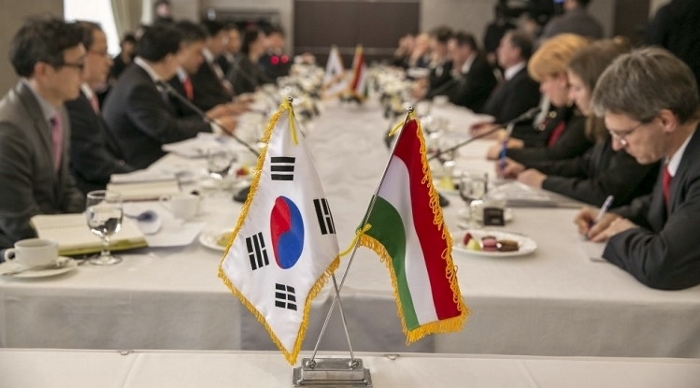
Q: Have you perhaps sensed some kind of inexplicable similarity between Korean and Hungarian people, I mean not racially, of course. How could you depict the Hungarians?
H.E. Yim Geun-hyeong: To be honest, even after my two-and- a- half-year stay in Hungary I am totally not able to tell, how a typical Hungarian looks like. I have been sincerely wondering that what elements make you Hungarians so unique? Because, by appearance you are very different from each other, which is understandable, as over the history Hungarians have been mixed up with the neighboring and other people, etc. One such thing definitely should be your language. You may argue that many Hungarians are still reluctant to speak foreign languages, while Hungarian has no common roots with the major European language families and nobody can understand your language. My opinion is that your ’language problem’ is not necessarily a bad thing. Let me explain this with an example from my earlier diplomatic experience. I’ve mentioned that before Hungary I had been posted to Denmark. While a typical Dane can be described as a very tall, very blond person with very white skin, the general description of a Hungarian cannot be schematized. But at least there is one thing which is very common in you with the Danes, and this is the affection to your mother tongue. And you know, this is something what small nations can, moreover, must do. The Danes are even less in population than you and they are very proud of their language. And although they are pretty open to foreign cultures, they are really rigid when it comes to the issue of immigration. Immigrants are not really welcome in Denmark.
Q: By Your Excellency’s favor, neither the majority of Hungarians are flexible with this…
H.E.Yim Geun-hyeong: I am aware of this and believe me, I totally understand this mentality of small nations. Denmark and Hungary cannot be compared with such big countries and nations like Germany or France where the population is over 80 or nearly 70 million, respectively. If you follow the same widely receptive policy towards a big and completely different culture, your national characteristics might disappear within a very short period of time. Therefore the language, which is one of the most crucial elements of a nation’s cultural character, should be preserved and cultivated. By this I don’t mean you don’t have to speak foreign languages and respect other cultures, on the contrary, since we live in a globalized world. But you should be aware of the balance and never lose the focus.
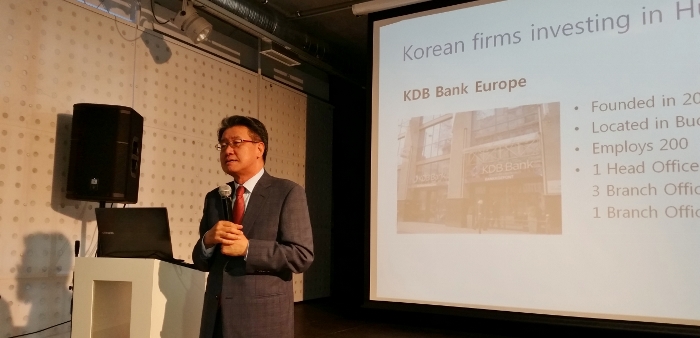
H.E's presentation at KCC in Budapest on May 25, 2017
Q: How would you evaluate Korea’s economic, cultural and other relations with Hungary as of today? Can we be addressed as „strategic partners” in your view?
H.E.Yim Geun-hyeong: Since in my latest presentation at KCC many respects of this issue have been detailed, now I would highlight some specific elements only, if you like, I would approach it from a more personal perspective.
Again, let me refer back to the past a bit. 1989 was a turning point both in history of Hungary and in our bilateral political connections, and, obviously it was a historical opportunity. Since out of the East European post-communist states, it was your country who first accepted our hand to establish diplomatic relations with us, the already economically toned-up Korea’s attention was primarily focused on Hungary in terms of investments of capital, too. That time your country was Korea’s first target in this region. We two, obviously have had big progress and mutual successes. As a result, Korean investors play key role in the Hungarian economy, and the estimated value of their investments exceeds 2 billion US dollar (*data from 2016). With this amount South Korea is the third most significant Asian investor in your country, and the approximately 50 major Korean businesses active in Hungary provide jobs for 25,000 local citizens. Some of the iconic Korean companies, such as Hankook or Samsung have firmly settled their feet here.
And, of course, we cannot forget about the educational and cultural ties which represent one of the main boosters of our cooperation.
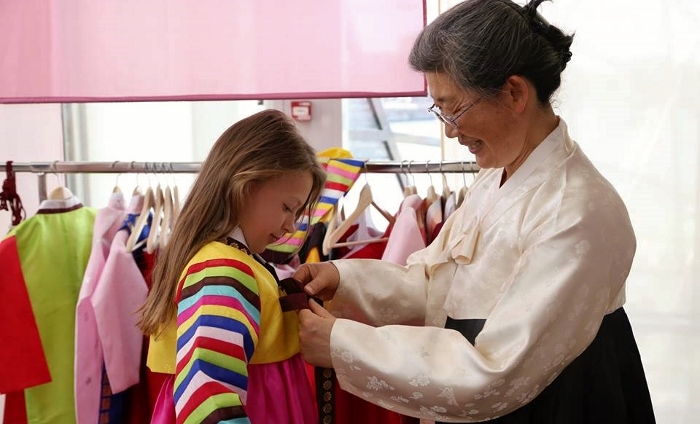
Korean Cultural Festival in Budapest (April, 2017)
The establishment of the Korean Department at ELTE and the uniquely intense activity of the Korean Cultural Center in Budapest all reflect Hungarians’ huge interest towards Korea, its language and culture. The Korean Cultural Festival in April of this year attracted 12,000 visitors, and KCC of Budapest won the title of the best Korean Cultural Centers in the world in 2016. As I see, this interest is mutual. 700 Korean students have graduated in Hungarian language recently, 415 Korean students are learning at Hungarian universities. But of course, an already built up relationship must be cultivated and constantly developed, so you can never lean back. We have great perspectives ahead and I firmly believe in it.
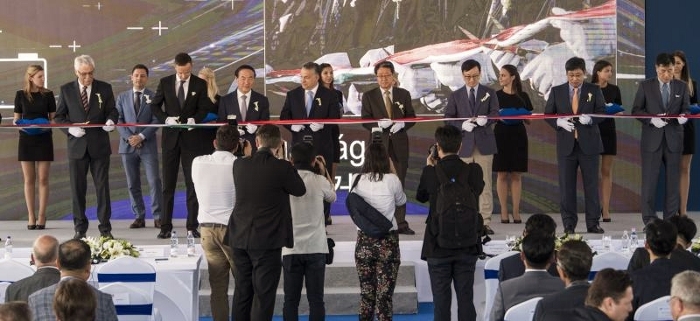
Samsung SDI celebrated the completion of construction of its EV (electric vehicle) battery plant in Göd, on May 29, 2017
Q: Your Excellency, your three-year term, as an Ambassador in Hungary, will come to an end in a couple of months. Your latest period has been topped by a remarkable business deal between our countries and the big event happened just one day before this interview. Am I wrong to say that the recent successful Samsung SDI investment in Hungary can be attributed also to your devoted mission?
H.E. Yim Geun-hyeong: Well, the fact is that Samsung SDI celebrated the completion of construction of its EV (electric vehicle) battery plant in Göd, on May 29. We are aware that Europe is leading the global EV market with its environment-friendly policy, and we could not miss the chance. (more information) It was not by accident that we have chosen Hungary to be the center of the production. Korean companies are confident about the Hungarian workers' qualification and trust in their capabilities. This new plant creates 500 new jobs and by the time it reaches its full capacity, it will hit the number of more than 2,000. There is something else I want to mention, which is very important. You know, during my stay in Hungary I’ve bumped into some administrative red tapes which are still more or less present, inherited from your socialist traditions. Other former communist countries, like Poland or the Czechs are gradually abandoning it, and recently there has been progress in your country as well. The Samsung SDI deal, for example, has been put across within ten months, that even in Korea would have taken a couple of years. I can state that your present governmental administration is open to global challenges and this fact provides us with encouragement to take further steps. All we need to revitalize our strategic partnership is strong will, courage and firm commitment.
Q: May I ask, what will be Your Excellency’s next station after leaving Hungary?
H.E. Yim Geun-hyeong: I will go back to Korea, where I will serve my country in a governmental post. Let me add that I have really enjoyed my stay in Hungary. Your government treats the diplomats very well, with many programs and events. Hungary is a nice place with attributable successes for Korea. I will have very nice memories of your country and people.
Q: As a closing paragraph to our talk, what is Your Excellency’s message to the Hungarians, in particular to the youngsters?
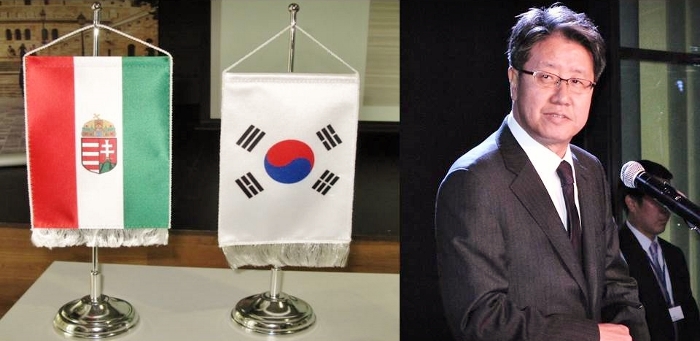
H. E.Yim Geun-hyeong: My message? Be courageous and committed! You are in the center of Europe, and compared to my generation’s era, you have now a really broad scale of opportunities, which is full of challenges. So, be brave, open your mind and follow your ambitions!
The interview was made at the Embassy of Korean Republic in Budapest on May 30, 2017, reporter: Edit Csajka
Source of Photos: Samsung SDI, MTI, Korean Cultural Center - Budapest, Edit Csajka

